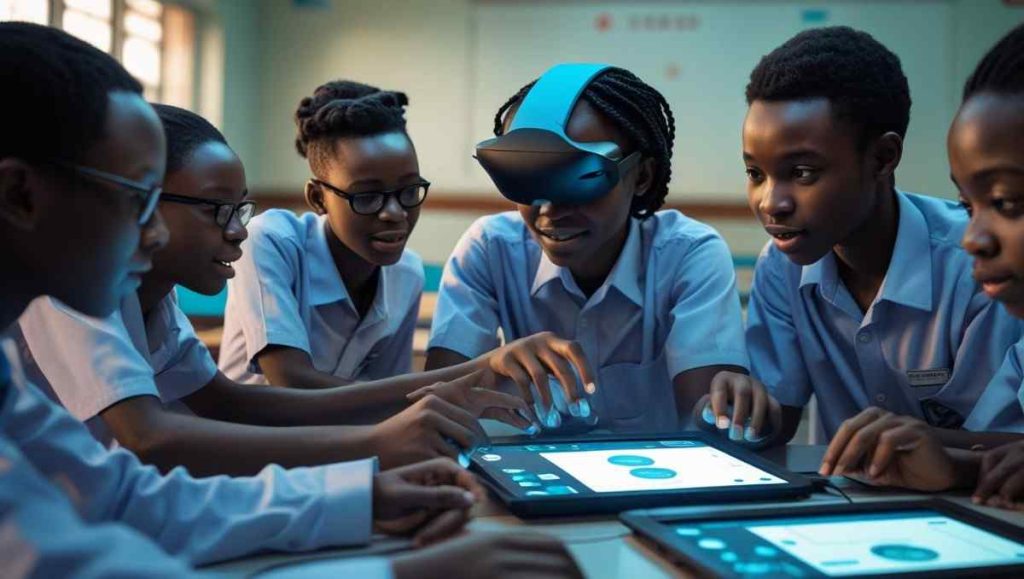
Beyond the Textbook: How AI and VR are Revolutionizing STEM Learning for O-Level & A-Level Students in Nigeria
For O-Level and A-Level students in Nigeria, especially those pursuing Science, Technology, Engineering, and Mathematics (STEM) subjects, the traditional classroom often presents a challenge. Complex scientific concepts can feel abstract, practical experiments might be limited by resources, and personalized learning paths are often a luxury. But what if technology could bridge these gaps, transforming how you engage with and master these critical subjects?
Enter Artificial Intelligence (AI) and Virtual Reality (VR). These aren’t just buzzwords; they’re powerful tools poised to redefine your learning journey, offering immersive and individualized experiences that go far beyond rote memorization, specifically within the Nigerian educational landscape.
AI: Your Personalized STEM Tutor and Data Analyst
Imagine having a tutor who understands your unique strengths and weaknesses in Physics, or an assistant that identifies exactly where you struggle in Chemistry calculations. That’s the power of AI in your hands, offering solutions tailored to the Nigerian student’s needs.
- Personalized Learning Paths:AI-powered platforms can analyze your performance, identifying specific topics where you need more practice or a different explanation. Instead of a one-size-fits-all approach, you get tailored content and exercises that adapt to your pace and learning style (ASU Prep Global, 2025; Nile University of Nigeria, n.d.). For instance, if you’re stuck on electromagnetism, an AI tutor can provide additional examples, interactive simulations, and even adjust the difficulty of questions until the concept clicks. This means no more getting left behind or being held back by a class’s overall pace, which is particularly beneficial in large class sizes often found in Nigerian schools (Sun.edu.ng, 2025).
- Instant Feedback and Remediation:Forget waiting days for your teacher to mark your assignments. AI can provide immediate feedback on your answers, whether it’s a multiple-choice quiz or a complex essay (SPH, 2025). This real-time guidance helps you understand your mistakes instantly and correct them on the spot, solidifying your understanding. Imagine solving a challenging calculus problem and immediately knowing if your steps are correct, allowing you to learn from errors rather than repeating them. This can significantly reduce the burden on teachers, allowing them to focus more on higher-order thinking skills and creative teaching (Tribune Online, 2025b).
- Predictive Analytics for Targeted Support:AI can also act as an early warning system. By analyzing your engagement and performance patterns, it can flag areas where you might struggle before you even realize it (Nile University of Nigeria, n.d.). This allows your teachers to intervene proactively with targeted support, ensuring you get the help you need precisely when you need it. Think of it as a smart system that helps you stay ahead of potential academic hurdles, ultimately contributing to improved learning outcomes for students (World Bank Blogs, 2025a).
VR: Stepping Inside the Science
While AI offers intellectual tailoring, Virtual Reality provides unparalleled immersion, making abstract concepts tangible and allowing for hands-on learning without the physical limitations of a laboratory – a significant advantage where lab resources might be scarce.
- Immersive Science Labs:Ever wish you could conduct that tricky organic chemistry experiment without the risk of spills or limited reagents? VR simulations allow you to step into virtual laboratories, where you can safely experiment, manipulate variables, and observe reactions in a realistic 3D environment (ClassVR, 2022). This isn’t just watching a video; you’re actively performing the experiment, gaining practical experience and understanding the underlying principles in a way textbooks can’t convey. This is especially impactful in Nigeria where access to well-equipped labs can be a challenge, bridging educational gaps by providing virtual access to essential resources (TheCable.ng, 2024).
- Exploring Complex Concepts in 3D:Imagine exploring the intricate structure of a human cell in biology, or walking through the components of a nuclear reactor in physics. VR can transport you to these otherwise inaccessible environments, allowing you to interact with 3D models and gain a deeper spatial understanding of complex systems (Immerse Education, 2025). This visual and interactive approach can significantly improve your comprehension and retention of information, especially for subjects requiring strong spatial reasoning.
- Virtual Field Trips and Historical Recreations:History lessons can come alive with VR. Instead of just reading about ancient civilizations or historical events, you could virtually walk through the Roman Colosseum, witness a pivotal moment in Nigerian history, or explore the surface of Mars (Question What’s Real™, 2024). These immersive experiences foster a deeper connection to the subject matter, making learning memorable and engaging, and can instill skills like problem-solving and critical thinking (TheCable.ng, 2024). UNICEF has even been involved in pilot projects introducing VR into Lagos high school classrooms for subjects like Maths and Basic Science, measuring learning outcomes directly (UNICEF Office of Innovation, 2019).
The Future is Now
For O-Level and A-Level students in Nigeria, embracing AI and VR in your STEM education isn’t just about adopting new gadgets; it’s about unlocking a more effective, engaging, and personalized learning experience. As these technologies become more accessible, they will empower you to move beyond the confines of traditional learning, preparing you not just for exams, but for a future where critical thinking, problem-solving, and technological literacy are paramount. Recent initiatives and expert recommendations in Nigeria highlight the urgent need to integrate AI and digital skills into the curriculum from an early age to prepare students for the global workforce (Punch Newspapers, 2025; Sun.edu.ng, 2025).
The World Bank’s recent blog posts even discuss the impressive learning gains seen in Edo State, Nigeria, through a randomized controlled trial using generative AI for personalized tutoring, showing significant improvements in student performance (World Bank Blogs, 2025a; 2025b). This demonstrates that the future of education with AI and VR is not a distant dream, but a rapidly unfolding reality right here in Nigeria.
References
- ASU Prep Global. (2025, February 24). Discover The Top 12 Benefits Of AI In Education. Retrieved fromhttps://www.asuprepglobal.org/news/benefits-of-ai-in-education/
- Chaman Law Firm. (n.d.). Revolutionizing Learning: The Powerful Impact Of Technology On Nigerian Education. Retrieved fromhttps://chamanlawfirm.com/the-role-of-technology-in-nigerian-education/
- (2025, February 28). How VR transforms education institutions: challenges, benefits, and use cases. Retrieved fromhttps://geniusee.com/single-blog/virtual-reality-in-education
- Immerse Education. (2025, March 11). Virtual Reality in Education: Enhancing Learning Applications. Retrieved fromhttps://www.immerse.education/educational-innovation/edtech/virtual-reality-in-education-enhancing-learning-applications/
- (2024, December 26). Emerging Technologies in Education: Statistics on AI and VR Adoption Rates in 2024. Retrieved fromhttps://www.matsh.co/en/statistics-on-ai-vr-adoption-in-education/
- (2025, May 8). AI Impact on Education: Its Effect on Teaching and Student Success. Retrieved fromhttps://www.netguru.com/blog/ai-in-education
- Punch Newspapers. (2025, April 30). Nigerian schools must integrate AI into curriculum – Expert. Retrieved fromhttps://punchng.com/nigerian-schools-must-integrate-ai-into-curriculum-expert/
- Tribune Online. (2025, May 21). Role of AI in transforming Nigeria’s education sector. Retrieved fromhttps://tribuneonlineng.com/role-of-ai-in-transforming-nigerias-education-sector/



